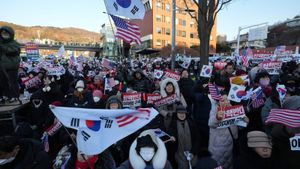Colombian President Gustavo Petro has made headlines by urging undocumented Colombians residing in the United States to quit their jobs and return to their homeland immediately. The plea came amid rising tensions between Colombia and the US, particularly surrounding immigration policies where the pressure from US President Donald Trump was palpable.
On February 1, 2025, Petro took to social media, posting on X (formerly Twitter), where he stated, "Wealth is only produced by the working people," and emphasized the need for solidarity among Colombians as they seek to build social wealth within their own country. The urgency of this appeal seems rooted in both economic and social motivations, aiming to revolutionize the notion of wealth generation among his countrymen.
The Colombian government's recent stance marks quite the turnaround from its initial resistance to US deportation flights. Just days before Petro's call for voluntary returns, he had attempted to block these flights, arguing against their treatment of migrants, which included their transportation under severe conditions. It wasn't long, though, before he buckled under Trump's pressure, which included threats of punitive tariffs up to 50% on Colombian goods.
Two Colombian military planes transported more than 200 migrants back to Colombia recently. These flights, part of the larger deportation system the US applies, have not gone unnoticed. Reports surfaced as José Montaña, one of the returning migrants, described the conditions aboard the flights as alarming. "Migrants were shackled from our feet, our ankles to our hips, like criminals," he told the Associated Press, shedding light on the often distressing realities faced by deportees.
Petro's administration is promising financial support for those who accept his offer to return home. The government plans to provide loans through its Department of Social Prosperity, aimed at assisting returnees to start their businesses. The offer, paired with his appeal, is intended to encourage undocumented Colombians to reinvest their skills and labor back home.
The backdrop of this situation includes Argentina's recent skirmishes with the US over similar issues. Following Petro's public request, many Colombians now face the dilemma of returning home, often with mixed emotions about leaving the lives they built abroad.
Petro's remarks come after heated exchanges with the Trump administration where accusations of mistreatment of migrants by US officials sparked widespread outrage. Addressing the American political climate, he remarked on the cruel conditions many face when deported, implying the need for humane treatment of migrants, regardless of their status.
Leaders like Petro face pressing responsibilities, balancing the need to protect immigrants' rights and the economic contexts of their home nations. Amid his efforts to bring back nationals and mend the rift caused by previous exchanges with Trump, he recognizes the potential contributions former migrants can make to Colombia.
Colombia's acceptance of deportation flights has significantly increased over the years, indicating the bilateral relationship's complexity, as well as internal policies' effects. According to advocacy group Witness at the Border, Colombia ranked fifth overall for accepting deportation flights from the US, part of the broader trend toward stricter immigration controls.
Now, as Petro calls on his citizens to return, the narrative of wealth creation through labor must resonate with those feeling the effects of Trump’s immigration policies. The drive for social wealth must not only include incentivizing migrants to come back but also implementing measures to support their reintegration effectively.
While the political ramifications of such policies are being debated, there is no denying the impact on the lives of individuals and families caught between two worlds. The social fabric of Colombia can be significantly altered as these decisions ripple through communities.
Petro's political maneuvers showcase the delicate combination of responding to international pressures and favoring domestic welfare. This modern era of migration, marked by economic challenges and globalization, has prompted leaders like Petro to rethink strategies and engage directly with their expatriates.
Looking to the future, how these processes evolve will be pivotal not just for Colombia's economic health but also for the strength of its diasporic communities. The coming months will reveal how this story plays out as Colombians weigh their options and futures amid the nation's shifting landscapes.



